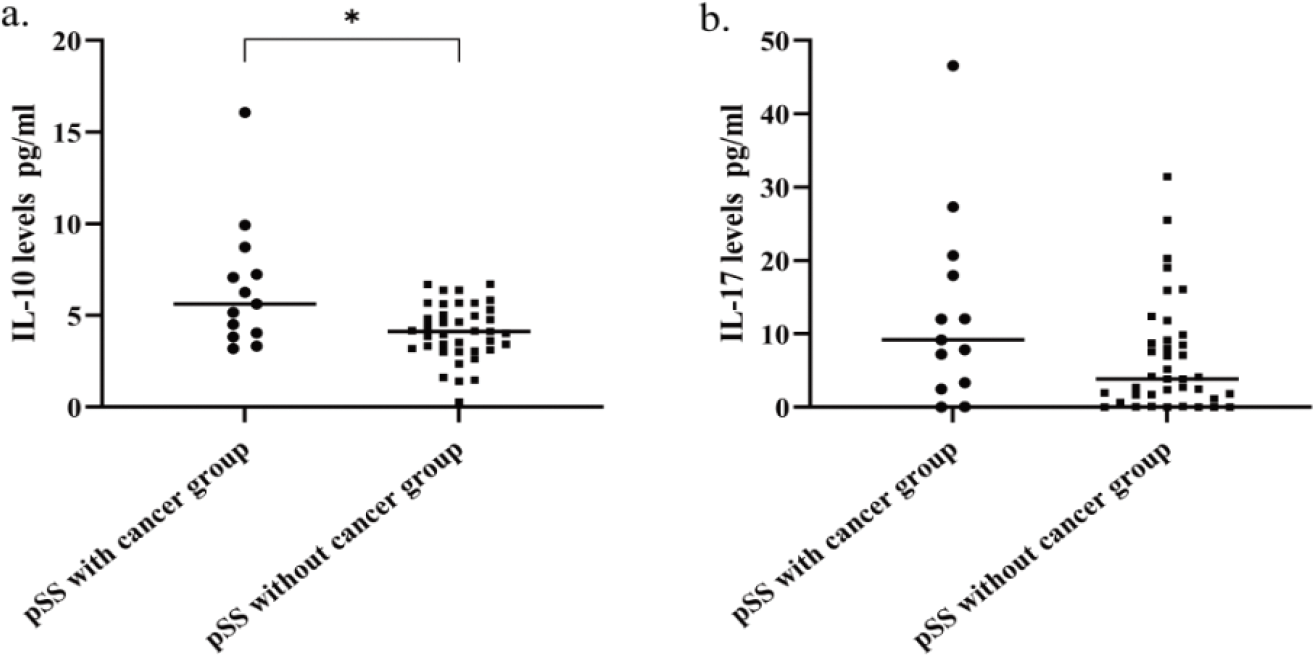

Background: Primary Sjögren’s syndrome (pSS) is associated with a significantly higher incidence of malignancies compared to the general population [1, 2]. However, most of the currently identified predictive factors are primarily related to the severity of pSS, while specific and sensitive biomarkers linked to the underlying mechanisms of cancer progression remain to be elucidated. As a result, cancer prevention in pSS patients remains a major unmet need. Studies have revealed that a decrease in the number and/or dysfunction of regulatory T (Treg) cells is closely associated with the pathogenesis and clinical progression of pSS [3]. Given their dominant role in immunosuppression, Treg cells are also crucial players in tumor immune escape, drawing significant attention in the context of cancer pathogenesis [4]. The impaired inhibiting function of Treg cells promotes the progression of pSS, while activation of Treg cell function tends to induce cancer development. This suggests that Treg cells in pSS patients may undergo significant alterations during the development of malignancy. However, Treg cells have been rarely investigated in pSS patients with cancer.
Objectives: Given the pivotal role of Treg cells in both cancer and pSS pathogenesis, we aimed to investigate their involvement in pSS-associated malignancies. Examining alterations in Treg cells may offer valuable insights for the early identification of pSS patients at high risk of developing cancer.
Methods: A total of 27 pSS patients with cancer, 108 pSS patients without cancer, and 30 healthy controls were enrolled in the study. General clinical data were collected, and the absolute counts of peripheral lymphocytes and CD4 + T cell subsets were examined by flow cytometry. The clinical and laboratory characteristics, as well as the immunophenotypic profiles of peripheral lymphocytes and CD4+ T cell subsets, were compared between groups.
Results: The absolute counts of Treg cells were significantly higher in the pSS with cancer group compared to the pSS without cancer group [30.15 (19.87-47.56) vs. 21.54 (14.74-29.12), respectively, p = 0.003]. The comparison of absolute T helper-17 (Th17) cell counts between the two groups showed no difference [6.68 (3.75-10.54) vs. 7.37 (3.00-11.67), respectively, p = 0.932]. The Th17/Treg cell ratio was lower in the pSS with cancer group than in the pSS without cancer group [0.17 (0.12-0.38) vs. 0.33 (0.17-0.56), respectively, p = 0.016]. Interleukin-10 (IL-10) levels were increased in pSS patients with cancer compared to pSS patients without cancer [5.62 (3.93-7.99) vs. 4.12 (3.13-5.31), respectively, p = 0.014]. Elevated Treg cell levels were associated with the development of C3 ( p = 0.035) or C4 hypocomplementemia ( p = 0.018), which are significant predictors of lymphoma, and were negatively correlated with serum C3 levels (r = -0.387, p = 0.046).
Conclusion: This study represents an initial attempt to dissect Treg cells in pSS and their possible role in pSS-associated malignancies. Our findings suggest that both the expression and function of Treg cells may be altered during the progression from pSS to malignancy, indicating that clinicians should be alert to the presence of elevated Treg cell counts in pSS patients. Further studies may identify Treg cells as a specific molecular biomarker for predicting cancer development in pSS, which could facilitate targeted follow-up and therapeutic monitoring of patients at high risk of developing malignancy.
REFERENCES: [1] Zhong H, Liu S, Wang Y, Xu D, Li M, Zhao Y, Zeng X (2022) Primary Sjögren’s syndrome is associated with increased risk of malignancies besides lymphoma: A systematic review and meta-analysis. Autoimmun Rev 21:103084.
[2] Liang Y, Yang Z, Qin B, Zhong R (2014) Primary Sjogren’s syndrome and malignancy risk: a systematic review and meta-analysis. Ann Rheum Dis 73:1151-1156.
[3] Blinova V G, Vasilyev V I, Rodionova E B, Zhdanov D D (2023) The Role of Regulatory T Cells in the Onset and Progression of Primary Sjögren’s Syndrome. Cells 12:1359.
[4] Kumagai S, Itahashi K, Nishikawa H (2024) Regulatory T cell-mediated immunosuppression orchestrated by cancer: towards an immuno-genomic paradigm for precision medicine. Nat Rev Clin Oncol 21:337-353.
Comparison of absolute counts of Treg and Th17 cells between three groups. (* p < 0.05, ** p < 0.001.)

Comparison of IL-10 and IL-17 levels between pSS patients with and without cancer. (* p < 0.05)

Acknowledgements: NIL.
Disclosure of Interests: None declared.
© The Authors 2025. This abstract is an open access article published in Annals of Rheumatic Diseases under the CC BY-NC-ND license (